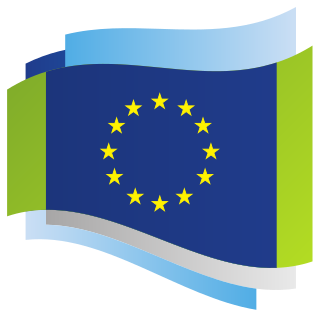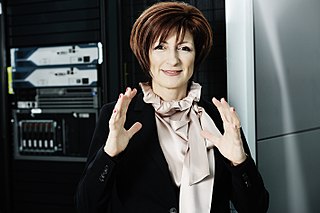
The Planetary Society is an American internationally-active non-governmental nonprofit organization. It is involved in research, public outreach, and political space advocacy for engineering projects related to astronomy, planetary science, and space exploration. It was founded in 1980 by Carl Sagan, Bruce Murray, and Louis Friedman, and has about 60,000 members from more than 100 countries around the world.

Science policy is concerned with the allocation of resources for the conduct of science towards the goal of best serving the public interest. Topics include the funding of science, the careers of scientists, and the translation of scientific discoveries into technological innovation to promote commercial product development, competitiveness, economic growth and economic development. Science policy focuses on knowledge production and role of knowledge networks, collaborations, and the complex distributions of expertise, equipment, and know-how. Understanding the processes and organizational context of generating novel and innovative science and engineering ideas is a core concern of science policy. Science policy topics include weapons development, health care and environmental monitoring.

Science and technology studies (STS) or science, technology, and society is an interdisciplinary field that examines the creation, development, and consequences of science and technology in their historical, cultural, and social contexts.

The European Defence Agency (EDA) is an agency of the European Union (EU) that promotes and facilitates integration between member states within the EU's Common Security and Defence Policy (CSDP). The EDA is headed by the EU High Representative for Foreign Affairs and Security Policy, European Commission’s Vice President (HR/VP), and reports to the Council. The EDA was established on 12 July 2004 and is based in Brussels, Belgium, along with a number of other CSDP bodies.
The American Council of Learned Societies (ACLS) is a private, nonprofit federation of 75 scholarly organizations in the humanities and related social sciences founded in 1919. It is best known for its fellowship competitions which provide a range of opportunities for scholars in the humanities and related social sciences at all career stages, from graduate students to distinguished professors to independent scholars, working with a number of disciplines and methodologies in the U.S. and abroad.

Citizen science is scientific research conducted with participation from the general public. There are variations in the exact definition of citizen science, with different individuals and organizations having their own specific interpretations of what citizen science encompasses. Citizen science is used in a wide range of areas of study, with most citizen science research publications being in the fields of biology and conservation. There are different applications and functions of citizen science in research projects. Citizen science can be used as a methodology where public volunteers help in collecting and classifying data, improving the scientific community's capacity. Citizen science can also involve more direct involvement from the public, with communities initiating projects researching environment and health hazards in their own communities. Participation in citizen science projects also educates the public about the scientific process and increases awareness about different topics. Some schools have students participate in citizen science projects for this purpose as a part of the teaching curriculums.
The Framework Programmes for Research and Technological Development, also called Framework Programmes or abbreviated FP1 to FP9, are funding programmes created by the European Union/European Commission to support and foster research in the European Research Area (ERA). Starting in 2014, the funding programmes were named Horizon.
Electronic participation (e-participation) refers to the use of ICT in facilitating citizen participation in government-related processes, encompassing areas such as administration, service delivery, decision-making, and policy-making. As such, e-participation shares close ties with e-government and e-governance participation. The term's emergence aligns with the digitization of citizen interests and interactions with political service providers, primarily due to the proliferation of e-government.
VA is a Vetenskap & Allmänhet, VA, is a non-profit association that wants to promote dialogue and openness between researchers and the general public. VA operates primarily Sweden, but with an eye on European and International science communication including several new EU projects. The organization was founded in 2002 and is currently based from Grev Turegatan 14 in Stockholm, Sweden.

Sonia Livingstone is a leading British scholar on the subjects of children, media and the Internet. She is Professor of Social Psychology and former head of the Department of Media and Communications at the London School of Economics and Political Science. While Livingstone’s research has evolved since the start of her career in the 1980s, her recent work explores media and communication in relation to society, children and technology. Livingstone has authored or edited twenty-four books and hundreds of academic articles and chapters. She is known for her continued public engagement about her research areas and has advised the UK government, European Commission, European Parliament, UN Committee on the Rights of the Child, OECD, ITU and UNICEF, among others, on children’s internet safety and rights in the digital environment. In 2014, Livingstone was awarded the title of Officer of the Order of the British Empire (OBE) "for services to children and child Internet safety".
Darlene Cavalier is an American professor of practice at Arizona State University's School for the Future of Innovation in Society. She is the founder of SciStarter, founder of Science Cheerleaders, cofounder of ECAST: Expert and Citizen Assessment of Science and Technology, and she led the ideation and a team of collaborators to develop ScienceNearMe.org to connect, promote and research all types of opportunities for the public to engage in science.

George Joseph is an Indian space scientist, best known for his contributions to the development of remote sensing technology in India, especially in the field of earth observation sensors. He is a former chairman of the Lunar Mission Study Task Force of the Indian Space Research Organization and an elected fellow of the National Academy of Sciences, India, Indian Academy of Sciences and Indian National Academy of Engineering. The Government of India awarded him the Padma Bhushan, the third highest civilian award, in 1999.

Sasha Bezuhanova is a Bulgarian public figure – business leader, investor and philanthropist with 20-years executive business career in HP and a multi-dimensional track record of service to society.
Innovation Research Interchange (IRI) is a division of the National Association of Manufacturers, a nonprofit association based in Washington, D. C., United States. IRI was founded as a private non-profit association in 1938 and merged with the NAM in 2022. IRI's mission is "To enhance the innovation leader’s and innovation teams’ ability to create new value and growth by providing platforms and learning opportunities to share best and next practices, improving team and individual competencies, providing strategic information on the future of innovation execution and leadership, and enhancing and supporting a vibrant community for innovation leadership."
The European Composer and Songwriter Alliance (ECSA) is an international, non-profit organization based in Brussels, and composed by more than 55 associations of composers and songwriters in more than 25 different European countries. It represents around 30,000 music creators and was founded in 2007. ECSA is co-financed by the Creative Europe Programme of the European Union.

Francesca Bria is the President of the Italian National Innovation Fund. She is an Italian innovation economist and information technologist who lectures at various universities and is a consultant to the United Nations and the European Commission.
The Citizen Science Association also known as the CSA is a member based professional organization for practitioners and researchers of citizen science. The CSA was founded in 2013 in the United States and was ruled a charitable organization with a 501c3 designated status in June 2017. Ubiquity Press publishes an open source peer reviewed journal called Citizen Science: Theory and Practice on behalf of The Citizen Science Association.

Ulrich Dolata is a German sociologist.

Amanda Edwards is an American attorney and politician who served as a member of the Houston City Council. She was a candidate for the 2020 United States Senate election in Texas, in which she placed fifth in the Democratic primary. She later briefly ran for mayor of Houston before dropping out to run for a seat in the U.S. House.
Shobita Parthasarathy is an American academic, author, and contributor to the field of Science and Technology Studies based at the Gerald R. Ford School of Public Policy at the University of Michigan. She is the director of the Science, Technology, and Public Policy Program, a research, education, and policy engagement center concerned with questions at the intersection of science, technology, policy, and society. She has received numerous prominent awards and grants for her work and has provided expert advice on technology, equity, and policy to civil society groups, international organizations, and governments around the world, including testimony to the U.S. Congress.










